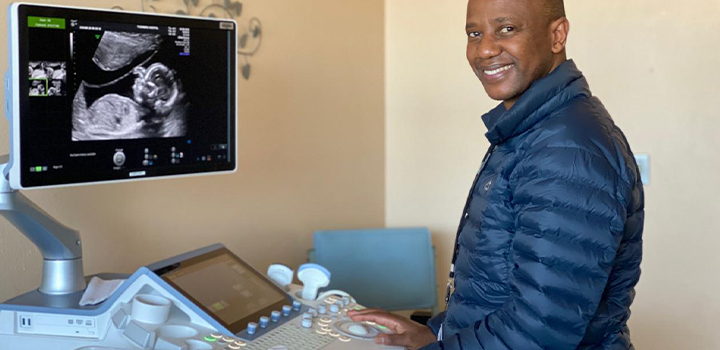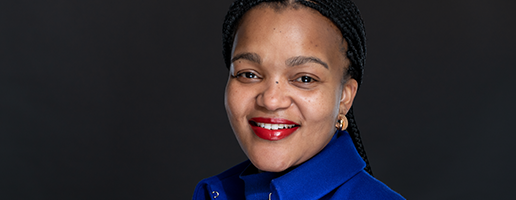High-risk pregnancies in rural Mpumalanga: a dedicated doctor to the rescue

Having a high-risk pregnancy if you live far away from an urban centre is a terrifying experience. Many women in Mpumalanga are thankful that Dr Sibusiso Nhlapo, obstetrician and gynaecologist, didn't listen when his parents suggested he become a teacher.
Dr Sibusiso Nhlapo hopes to make a difference in the lives of rural women who are experiencing pregnancy complications - and a grant from the Discovery Foundation is helping him do that. His goal is to establish a maternal foetal medicine service in the province of Mpumalanga. But his journey has not been without obstacles.
Dr Nhlapo was born and raised in Newcastle, KwaZulu-Natal. He did most of his schooling in Madadeni, an informal settlement in Newcastle, and the last two years at Bethel College in Butterworth in the Eastern Cape. He then started a degree in education at the University of Zululand. It seemed like the obvious thing to do, as both his parents as well as his four older sisters are all teachers. But after a year he realised that it wasn't for him, and against his parents' wishes, Dr Nhlapo changed to a BSc in biological sciences.
"A family of women inspired my career choice"
"Teaching was in their blood, and it had provided them with a safe and secure living. They just wanted me to have the same thing, but I quickly realised that school teaching wasn't really my thing," he says. "Becoming a doctor had always been a childhood dream of mine. Now they are proud of me, but initially they had their doubts."
After his BSc, Dr Nhlapo did a degree in medicine at the Medical University of South Africa, followed by several years of working as a GP in Empangeni and Volksrust. During this time, he completed an MMed in public health and in clinical epidemiology at Wits University.
"After a few years of working as a medical officer in the public sector, I decided to specialise in obstetrics and gynaecology, because of my passion for women's health," he says. His interest in women's health comes from his ongoing concern for the health and wellbeing of his mother and four sisters.
"I then completed an MMed degree in obstetrics and gynaecology with the University of Stellenbosch, with a research focus on gestational diabetes. I also completed a fellowship in obstetrics and gynaecology at the Colleges of Medicine of South Africa. After working in the private sector at Mediclinic Highveld, and as a sessional specialist consultant at Evander Hospital in Mpumalanga, I saw the need for a maternal foetal medicine service in that province."
Maternal foetal medicine is a sub-specialisation in the field of obstetrics. Dr Nhlapo explains that these specialists manage the full range of health concerns of the mother and baby before, during and shortly after birth. The patients who need these services often experience high-risk pregnancies. Risk factors could include being under 17 or over 35, having HIV, high blood pressure or diabetes, or heart, lung and kidney problems.
"A matter of life and death"
Dr Nhlapo's passion for his work shines through when he speaks of the difficulties that women who have high-risk pregnancies experience in accessing specialist services in the urban centres several hours away. Mpumalanga, like many other rural areas in South Africa, does not have maternal foetal medicine sub-specialist services and patients struggle to access these services in Johannesburg and Pretoria.
"The cost and the distance are a problem, and it's difficult and time-consuming for them to get in the system. Also, with high-risk pregnancies, ongoing monitoring is essential. A once-off visit to a specialist is simply not sufficient. It is heart-breaking when a high-risk pregnancy has a poor outcome because of a lack of access to maternal foetal medical services. These services save lives," he says.
Several factors contribute to the increase in high-risk pregnancies, including the fact that women tend to have babies at a later age, and a general increase in the number of women who have high blood pressure or diabetes, or who develop gestational diabetes.
"And," says Dr Nhlapo, "it's not just a case of 'happy mother, healthy baby'. I also get a tremendous sense of fulfilment from achieving a good pregnancy outcome with a patient, especially if things were not straightforward."
"It's a very emotionally intense job being an obstetrician, and it is essential to have a good support system among one's colleagues," he adds. "I want my patients to be happy and fulfilled, and it is very difficult for me not to feel that I have failed a patient and her family if the pregnancy outcome is not good."
A maternal foetal medicine service in Mpumalanga
Dr Nhlapo's chosen sub-specialty deals with high-risk pregnancies complicated by medical conditions and foetal anomalies. He is focusing on pregnancy outcomes of women with Takayasu's arteritis, a rare type of vasculitis that causes blood vessel inflammation and damages the aorta. This usually affects women of childbearing age.
His father, who was passionate about improving lives with education, inspired him to do the same. Dr Nhlapo was elated to receive the grant from the Discovery Foundation, as it would help him establish a maternal foetal medicine service in Mpumalanga and improve people's lives.
"This would not only benefit rural women with high-risk pregnancies, but also provide mentoring and educational opportunities for the doctors providing maternal health care and benefit medical students who may be sent for practical training in the province from the nearby medical schools," he concludes.
This article was created for the 2020 Discovery Foundation Awards and has been edited for the Discovery Magazine.
About the Discovery Foundation
Since 2006, the Discovery Foundation has invested over R256 million in grants to support academic medicine through research, development and training medical specialists in South Africa.
The Discovery Foundation is an independent trust with a clear focus - to strengthen the healthcare system - by making sure that more people have access to specialised healthcare services. Each year, the Discovery Foundation gives five different awards to outstanding individual and institutional awardees in the public healthcare sector.
Related articles

Despite a challenging year marked by the global COVID-19 pandemic, the Discovery Foundation continues to support cutting-edge clinical research and medical training in South Africa's public and academic medicine sector.
The Eastern Cape's first foetal medicine candidate hopes to save lives
When 2019 Discovery Foundation Sub-Specialist Award recipient Dr Nontsikelelo Gubu-Ntaba was still in high school, her mother completed a Bachelor of Education degree. Seeing her mother pursue her dreams has inspired Dr Gubu-Ntaba to study further.

Persistence and faith drive Dr Patricia Sebola to specialise in maternal care
Obstetrician and gynaecologist Dr Patricia Sebola initially self-funded her studies, but with her 2019 Discovery Foundation Sub-Specialist Award, she can sub-specialise in maternal and foetal medicine at the University of Pretoria in two years instead of four.